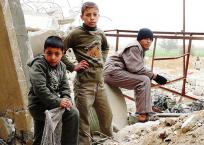
This morning, Amnesty International USA delivered thousands of signed postcards to the White House. The postcards call on President Obama to push for an end to Israel’s continuing blockade of the Gaza Strip. For over five years, the 1.6 million Palestinians of Gaza have lived under an Israeli military blockade that has left more than one million Palestinians dependent on international humanitarian aid.
The postcards, signed by thousands of Amnesty International supporters and members across the US, call attention to Israel’s near ban on exports from the Gaza Strip. The Gazan economy has been effectively crippled by this export ban and other aspects of the blockade.
As a result, massive numbers of Palestinians now live in a state of permanent unemployment. Our 2012 human rights report documents that over 70 percent of Gaza’s residents now depend on humanitarian aid. While imports into Gaza have increased since mid-2010, they are still far below the levels allowed before the blockade began in 2007.
The blockade also affects life in Gaza in other terrible ways. As we reported in 2012, “Israeli authorities hindered or prevented hundreds of patients from leaving Gaza to obtain medical treatment.” And Gaza workers and students find it all but impossible to leave the territory to pursue jobs or education elsewhere, even in the West Bank.
Join the campaign by emailing the White House.
It is important to note that Israeli civilians have long endured the firing of indiscriminate rockets and mortars by armed Palestinian groups based in Gaza. These indiscriminate rocket and mortar attacks are war crimes, which Amnesty International has condemned repeatedly. The continuing attacks on southern Israel, which killed 3 civilians last year, are one of the Israeli government’s stated justifications for continuing the blockade.

However, while Israel has the right to prevent weapons from entering Gaza, there is no justification for imposing blanket restrictions on the movement of people or goods in and out of the territory. The blockade constitutes collective punishment – a breach of international law. Under international law, you cannot blockade 1.6 million civilians because of the actions of a government or armed groups.
It is also worth noting that many Palestinians in Gaza have been killed by Israeli military actions, some of which were war crimes. During the 2008-2009 Israeli military offensive in Gaza, some 1,400 Palestinians were killed. Some 300 children and hundreds of other unarmed civilians — who took no part in the conflict — were among those killed. For these victims, there has been no accountability or reparations to date.
The Gaza Strip is a tiny territory, measuring 25 miles in length by an average of less than 6 miles in width. Together with the West Bank, including East Jerusalem, these areas comprise the Occupied Palestinian Territories. They remain under Israeli military occupation and effective control, though local Palestinian authorities with limited powers exercise governmental authority in the West Bank and Gaza. They are recognized as one territory under international humanitarian law.
In the West Bank, the local governing body with limited powers is the Palestinian Authority, led by the political party Fatah. Gaza meanwhile has been been under the Hamas de facto administration since June 2007. Even though these are local Palestinian authorities, Israel remains the occupying power. As a result, Israel bears foremost responsibility for ensuring the welfare of the inhabitants of the Occupied Palestinian territories. To make matters even more complicated, Gaza also shares a border with Egypt. This means that Egyptian authorities are also partly responsible for the suffering of Gaza civilians living under the blockade.
Palestinians in both Gaza and the West Bank experience a range of human rights violations – and not just from Israeli soldiers and officials. In Gaza, for example, as I’ve previously written, human rights violations by the Hamas authorities include torture, unfair trials, and the death penalty.
But Israel’s blockade is a dominant factor when it comes to the quality of life in Gaza. A new UN report (pdf / press release) puts it succinctly:
Gaza is an urban economy, heavily reliant on intensive trade, communication and movement of people. The area has been essentially isolated since 2005, meaning that, in the longer term, its economy is fundamentally unviable under present circumstances. Gaza is currently kept alive through external funding and the illegal tunnel economy.
The UN report predicts that the combination of population growth and continued hardship will lead to dramatic challenges by 2020:
There will be virtually no reliable access to sources of safe drinking water, standards of healthcare and education will have continued to decline, and the vision of affordable and reliable electricity for all will have become a distant memory for most.
Thousands of Amnesty International members and supporters are right to be concerned. Israeli policy has cut off Palestinians in Gaza from the outside world. It is time for President Obama to call on the Israeli government to end the Gaza blockade.
